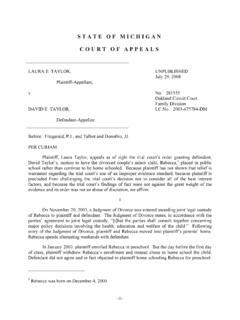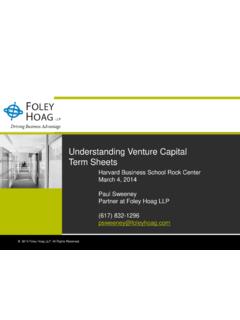Transcription of Noncompete Agreements Under Michigan Law
1 24 Michigan Bar Journal December 2016 Commercial noncompetes are governed by the antitrust rule of reason, not by the employment reasonableness testIn Innovation Ventures, LLC v Liquid Manufacturing, LLC,2 the Michigan Supreme Court held that a commercial noncom-pete provision must be evaluated for reasonableness Under the rule of reason. 3 The trial court and the Court of Appeals had held that a Noncompete between businesses was governed by the reasonableness test for employee noncompetes. The Su-preme Court reversed, holding:The Court of Appeals erred by applying the standard articu-lated in MCL , which is the proper framework to evaluate the reasonableness of Noncompete Agreements be-tween employees and employers.
2 Instead, the Court should have applied the rule of reason to evaluate the parties non-compete Court explained that commercial Noncompete agree-ments are governed by MCL the general contract The Michigan Supreme Court recently dispelled the common misperception that reasonableness is the test for the validity of all Noncompete Agreements . Reasonableness is the test only for employee noncompetes, while commercial noncompetes are invalid only if they fail the antitrust rule of reason. 1As a practical matter, few noncompetes violate the more exacting antitrust rule of reason, which requires an adverse impact on competition in the relevant market, not just an un-reasonable impact on a contracting party.
3 The typical com-mercial Noncompete (with sellers of a business, independent contractors, distributors, dealers, and franchisors) may be en-forceable even if unreasonable to a contracting contrast, employee noncompetes in Michigan must be reasonable, , limited to the duration, geography, and scope necessary to protect the employer s legitimate competitive interest. Drafting an enforceable employee Noncompete is a challenge. Using forms is ill-advised. The agreement should be customized to the particular employee(s) and the employer s interest being Facts:Different tests govern employee versus commercial noncompetes can be valid even if an unreasonable commercial Noncompete can be enforceable, as long as it does not violate antitrust Dennis M.
4 Haffey and James F. HermonWhile Employee Noncompetes Must Be Reasonable, Even Unreasonable Commercial Noncompetes May Be ValidNoncompete Agreements Under Michigan Law25 December 2016 Michigan Bar Journalprovision of the Michigan Antitrust Reform Act and that MCL codified the rule of reason by its language modeled on the federal Sherman Antitrust Act: A contract, combination, or conspiracy between 2 or more persons in restraint of, or to monopolize, trade or commerce in a rele-vant market is unlawful. 5 The Court directed lower courts to federal cases applying the antitrust rule of reason:[F]or evaluating a Noncompete agreement between two busi-ness entities.
5 MCL (2) instructs courts to look to federal interpretation of comparable ruling in Innovation Ventures is consistent with the Supreme Court s enforcement of contracts literally as funda-mental to the freedom of contract regardless of a contract s reasonableness. In Rory v Continental Insurance Company,7 the Court held that mere judicial assessment of reasonable-ness is an invalid basis upon which to refuse to enforce con-tractual provisions, because [w]hen a court abrogates unam-biguous contractual provisions based on its own independent assessment of reasonableness, the court undermines the par-ties freedom of contract, which is the bedrock principle of American contract 8 Rule of reason requires more than unreasonable impact on a partyTo invalidate a contract Under the antitrust rule of rea-son requires more than an unreasonable impact on a party.
6 Generally, the rule requires that the purportedly unlawful contract .. produced adverse anticompetitive effects within relevant product and geographic markets. 9 The antitrust laws were passed for the protection of competition , not competi-tors. The Supreme Court in Innovation Ventures noted that the proper focus includes whether the Noncompete may suppress or even destroy competition . 10 Injury merely to the plaintiff or a contracting party or single competitor does not suffice. Instead, [t]he test Under the rule of reason is whether competition in the overall market has been harmed .. 11To show that the market has been harmed, a defendant must have market This means that a defendant must have a dominant market share with the ability to raise prices above those that would be charged in a competitive mar-ket.
7 13 A plaintiff must show the market has suffered a reduc-tion in output or an increase in consumer prices. 14 The codification of the rule of reason in MCL con-tains no special language for noncompetes. The Court did cite some decisions in Innovation Ventures identifying cer-tain rule of reason factors, but it would be unwise to assume that those selected citations were an attempt to define a spe-cial rule of reason requirement for noncompetes, rather than illustrate that the requirements differ from the reasonable-ness standard for employee are federal cases that apply the rule of reason to commercial Noncompete Agreements and dismiss claims that fail to prove an adverse impact on competition in the relevant market.
8 For example, in Lektro-Vend Corporation v Vendo Company,15 the court held that a claim to invalidate a com-mercial Noncompete agreement failed because the plaintiffs did not establish the required 1 showing of adverse impact upon competition in the relevant market .. 16 Drafting enforceable employee noncompetes is a challengeThe typical commercial Noncompete agreement does not involve the rule of reason factors harm to competition in a relevant market, market power, antitrust injury, etc. and thus is enforceable according to its literal scope, even if un-reasonable to a contracting party. By contrast, literal language does not define the enforceability of employee noncompetes, which are used to protect employers competitive interests but face legal restrictions to protect the freedom of employees to change employment and maximize the value of their Effective drafters avoid cookie-cutter forms and instead cus-tomize to the particular employer, employee, and competitive interest to be protected.
9 Here are five practice a standalone, signed Noncompete agreementAn agreement not to compete buried in an employee hand-book risks being unenforceable. Handbooks are not always signed by employees and often contain disclaimers stating that they are not contracts but mere expressions of policy that can be unilaterally changed by the employer. Disclaim-ers help employers avoid breach of contract claims, but un-dercut an employer s ability to enforce a handbook provision as a agreement not to compete buried in an employee handbook risks being unenforceable. Handbooks are not always signed by employees and often contain disclaimers stating that they are not contracts but mere expressions of policy that can be unilaterally changed by the Bar Journal December 2016 Noncompete Agreements Under Michigan LawAs a practical matter, lawsuits to enforce noncompetes of-ten are won or lost at the temporary restraining order or pre-liminary injunction stage.
10 The employer must prove a valid Noncompete agreement, and a genuine dispute over whether there was knowing, mutual assent to terms buried in a hand-book imperils the grant of injunctive Get a separate signed agreement containing the Noncompete what state s law governsNoncompetes are creatures of state law, and enforceabil-ity varies by state. For example, California20 and North Da-kota21 prohibit enforcement of certain noncompetes. Illinois requires a certain duration of employment before an em-ployee is deemed to have business information sufficient to warrant a Other states have similarly unique laws. A choice-of-law provision in the Noncompete may help determine which law applies but is no cure-all, as rules for enforceability also vary by drafting employee noncompetes should con-sider not just where the employer is located, but where the employees live and work, which services they perform and where, and which interests are being protected, as well as the Noncompete laws of the states that are likely candidates in a dispute over which law Michigan s reasonableness requirementsWhen Michigan law applies, the drafting attorney should include recitals and evidence that help satisfy MCL.











